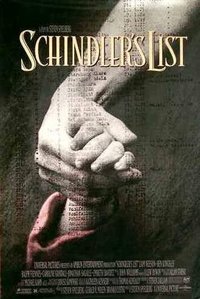Schindler's List
Schindler's List is a 1993 movie based on the book Schindler's Ark by Thomas Keneally, published in the United States as Schindler's List and subsequently re-issued in Commonwealth countries under that name as well. more...
The movie, adapted by Steven Zaillian and directed by Steven Spielberg, relates the tale of Oskar Schindler, a German Catholic businessman who was instrumental in saving the lives of over one thousand Polish Jews during the Holocaust. The title refers to a list of the names of 1,100 Jews whom Schindler hired to work in his factory and kept from being sent to the concentration camps.
Plot Summary
The movie begins with a depiction of a Jewish prayer. Opening the film with a religious ritual brings to mind the opening of Richard Attenborough's Academy Award-winning Gandhi (also with Ben Kingsley), in which the first scene shows the river Ganges, which is sacred to Hindus, and in the background can be heard a Hindu prayer chant.
At the end of the Jewish prayer, a candle burns out, and the film changes from color to black and white, setting the mood for the dark content of the film.
The German Army Invades Poland
The Polish Army has been defeated by the German Army in the initiating event of World War II in Europe. Jews living in occupied Poland are ordered to relocate to population centers. The film's action starts with crowds of Jews from all over the country, Hasidic, assimilated, rich, and poor, detraining in Kraków, and submitting their names to German officials waiting on the station platforms with typewriters and lists.
As this is happening, a newcomer has arrived in Krakow; his name is Oskar Schindler. Schindler, a heretofore unsuccessful businessman from Germany, has come to Poland with the hope of using the now abundant slave labor force of Jews and Poles to manufacture goods for the German Army. Schindler makes a very good impression with the occupation authorities early on, being a member of the Nazi Party and lavishing gifts and bribes upon the army and SS officials now running southern Poland. He becomes a friend to the SS and Police Leader of Krakow, Julian Scherner, and quickly calls in favors as Schindler begins to establish himself as a businessman in the Krakow region.
Schindler's Factory
With his military sponsors in his back pocket, he sets out to acquire a factory for the production of enamelware, mainly cookery. In his factory he is told to manufacture goods such as pots, pans, and cooking materials for the war effort. He hasn't the money to buy it, and his administrative skills are dubious at best, but he finds through his contact Itzhak Stern, a functionary in the local Judenrat (Jewish Council) who in turn has contacts with the now underground Jewish business community. Schindler makes the Jewish businessmen a deal they cannot refuse: they will loan him the money for the factory, and he will give them a small share of the pots and pans produced. He takes particular pleasure in telling them that they must take him at his word, and that no court would ever uphold a contract between a German and a Jew.
Schindler gets his money and starts the factory; he keeps the Nazis happy and enjoys his new-found wealth, while Stern actually operates the factory and uses his position to help his fellow Jews, who have now been confined to a ghetto within Krakow. Workers in Schindler's factory are allowed outside the ghetto, and are certified as "essential workers," guaranteeing that they will not be rounded up at night by the Gestapo. This last point is key, and Stern uses his considerable skills to make sure as many people as possible are deemed "essential" by the Nazi bureacracy, even children, the elderly, and the infirm — people who would otherwise be rounded up and sent away. Schindler becomes aware of what is going on, and seems embarrassed by the whole arrangement, but takes no action to stop it.
Where exactly the "unessential" people are sent is a matter of rumor among the Jews; a few suggest that they are taken off to concentration camps, but people hearing this reject the idea as ridiculous. One old woman exclaims, "We are their work force! Why would they want to kill their own work force?"
Read more at Wikipedia.org


